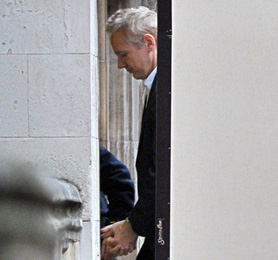WikiLeaks’ Julian Assange awaits bail hearing
WikiLeaks founder Julian Assange arrives at the High Court to learn whether he will be granted bail or left to remain in prison pending extradition proceedings next year.
Julian Assange, wanted in Sweden for alleged sex offences, was granted bail at a court hearing earlier this week.
But amid protests outside the High Court in London, the WikiLeaks founder retuned to prison after Swedish authorities appealed against the decision.
Bail conditions imposed at City of Westminster Magistrates’ Court included the posting of a £200,000 cash deposit, with a further £40,000 guaranteed in two sureties of £20,000.
Assange arrived at court today ahead of the hearing as the Crown Prosecution Service (CPS) confirmed that it made the call to appeal against bail, but would not comment on whether Sweden had any input in the decision.
“It is standard practice on all extradition cases that decisions regarding bail are taken by the domestic prosecuting authority,” a spokeswoman said.
“It would not be practical for prosecutors in a foreign jurisdiction, who are neither present in court when decisions are made, nor familiar with the domestic laws concerning bail, to make such decisions.”

The application is being heard by Mr Justice Ouseley who last week, in another high-profile case, rejected an appeal by South African authorities and allowed bail pending extradition proceedings for Shrien Dewani, the husband of a woman murdered on honeymoon in South Africa.
In the Assange case, an appeal was lodged after District Judge Howard Riddle told Assange he could be released from Wandsworth Prison in south-west London on condition he stay at the agreed address of a supporter and journalist Vaughan Smith.
‘Why I have offered Assange a place to stay’
Smith, founder of the journalists’ Frontline Club, offered to house the Australian.
Yesterday Vaughan Smith told Channel 4 News he has offered his Suffolk estate to the WikiLeaks founder because he wants to “see that Julian Assange gets justice”.
“I am a journalist and a former soldier. I am not uninformed about these matters. I expect I am going to get some flak, but my wife agreed with me about offering him a place to stay. I have children living with me, and Julian gets death threats. But I have complete confidence that the police will protect the address if they need to.
“I got to know Julian well over the last five months. As a journalist, I felt it is important to take a position on this issue. I think that Julian holds up a mirror that journalists like myself can look into, and perhaps we don’t always like what we see. I think journalism is getting closer to power and to the establishment than we have realised.”
Politicians in the United States have said Assange should be put on trial for treason and face the death penalty after leaking thousands of secret US military and political documents.
It is expected the authorities will argue today that bail should not be granted because there is a real risk that Assange will take flight to avoid extradition proceedings.
His supporters claim the criminal inquiry and extradition request is unfair and politically motivated.
High-profile backers, such as socialite Jemima Khan, novelist Tariq Ali, campaigner Bianca Jagger and film-maker Ken Loach, have tried to help Assange by offering sureties.
Others pledging support and waiting in the wings include author Hanif Kureishi and film-maker Michael Moore.




